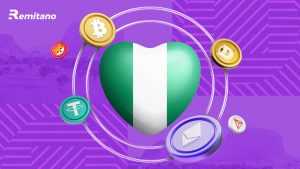Introduction
Nigeria has rapidly emerged as one of the most active countries in the global cryptocurrency space. With economic uncertainty, inflation, and limited access to traditional financial services, many Nigerians have turned to digital currencies as a means of preserving wealth, making transactions, and exploring new financial opportunities. According to Chainalysis and other blockchain analytics firms, Nigeria consistently ranks among the top countries for crypto adoption.

From Bitcoin to newer altcoins, Nigerian crypto enthusiasts are reshaping how money is saved, invested, and transferred. In this article, we’ll explore the top six most popular cryptocurrencies in Nigeria, highlighting their unique features, adoption trends, and the reasons behind their rising popularity.
1. Bitcoin (BTC)
Overview:
Bitcoin remains the most popular and widely used cryptocurrency in Nigeria. Launched in 2009 by an anonymous developer under the pseudonym Satoshi Nakamoto, Bitcoin is the pioneer of decentralized digital money.
Why Nigerians Love Bitcoin:
-
Hedge against inflation: Nigeria’s naira has been struggling due to inflation and foreign exchange restrictions. Many people use Bitcoin as a digital store of value.
-
Global access: Bitcoin enables cross-border payments without the need for banks or intermediaries.
-
Remittances and business transactions: Many Nigerians receive payments in BTC for freelance work or international trade.
Adoption Trends:
Bitcoin ATMs and P2P platforms like Paxful and Binance P2P have gained traction in Nigeria. Users buy and sell BTC with local currency through mobile apps or directly with each other.
Interesting Fact:
In 2021, Nigeria was ranked #1 in peer-to-peer Bitcoin trading volume on Paxful, surpassing even the U.S.
2. Ethereum (ETH)
Overview:
Ethereum is the second-largest cryptocurrency by market cap. Created by Vitalik Buterin in 2015, Ethereum introduced smart contracts and a decentralized application (dApp) platform that revolutionized the blockchain space.
Why It’s Popular in Nigeria:
-
Smart contracts and dApps: Nigerians use Ethereum to develop decentralized finance (DeFi) apps, games, and NFT platforms.
-
Investment purposes: ETH is often held as a long-term investment or used in staking.
-
Support from crypto exchanges: Ethereum is widely available on local and international exchanges.
Use Cases in Nigeria:
Young tech-savvy Nigerians are building blockchain startups using Ethereum. Also, Ethereum’s ERC-20 tokens are used in yield farming and DeFi applications.
Adoption Trends:
With Ethereum’s transition to Proof of Stake (Ethereum 2.0), Nigerian users are exploring staking and earning passive income through ETH.
3. Tether (USDT)
Overview:
Tether is a stablecoin pegged to the US Dollar, meaning 1 USDT is always worth around 1 USD. It’s used to avoid the price volatility of other cryptocurrencies.
Why It’s Popular in Nigeria:
-
Stability: During naira devaluation, people move funds into USDT to protect purchasing power.
-
Trading: Traders use USDT as a base currency to swap into other cryptos.
-
Remittances and savings: Tether acts as a digital dollar for saving or sending money.
Use Cases in Nigeria:
USDT is commonly used on P2P platforms, especially on Binance, where users trade directly in naira. It’s also used in crypto arbitrage trading between different exchanges.
Interesting Fact:
Tether is one of the most traded digital assets in Nigeria due to its simplicity and value stability.
4. Binance Coin (BNB)
Overview:
BNB is the native cryptocurrency of Binance, one of the world’s largest cryptocurrency exchanges. It powers the Binance ecosystem and offers various utility functions.
Why Nigerians Use BNB:
-
Lower trading fees: Binance users in Nigeria use BNB to get discounts on transaction fees.
-
Investment and staking: BNB is used in staking, yield farming, and other DeFi options.
-
Trust in Binance platform: Binance has a strong presence in Nigeria, making BNB a familiar and accessible option.
Adoption Trends:
Binance has hosted local events, contests, and training in Nigeria, creating a loyal BNB user base. Many DeFi platforms built on Binance Smart Chain (BSC) are also attracting Nigerian developers and users.
Real-World Use:
Nigerians use BNB to participate in Initial DEX Offerings (IDOs), launchpad events, and decentralized exchanges (DEXs) on BSC.
5. Tron (TRX)
Overview:
Tron is a decentralized blockchain platform founded by Justin Sun. It focuses on content sharing, smart contracts, and high-speed transactions with low fees.
Why It’s Gaining Popularity in Nigeria:
-
Ultra-low fees: Tron offers some of the cheapest transaction fees in crypto.
-
USDT on Tron: Most Nigerian users prefer sending USDT over the Tron network (USDT-TRC20) because it’s fast and inexpensive.
-
Gaming and dApps: Tron supports online games and dApps that attract Nigeria’s growing tech-savvy youth.
Use Cases in Nigeria:
People use TRX and USDT on the Tron network for remittances, online payments, and quick P2P transactions. It’s also a go-to network for online platforms that pay in crypto.
Interesting Insight:
TRON-based USDT transactions are significantly higher than Ethereum-based USDT transactions in Nigeria due to lower gas fees.
6. Solana (SOL)
Overview:
Solana is a high-performance blockchain known for its scalability, speed, and low transaction costs. Launched in 2020, it has quickly become a popular alternative to Ethereum.
Why It’s Catching On in Nigeria:
-
Fast and cheap transactions: Solana is appealing for developers and users frustrated with Ethereum’s high gas fees.
-
NFT ecosystem: Nigerian creators and artists are exploring Solana-based NFT marketplaces like Magic Eden.
-
Developer interest: With affordable costs and high throughput, Nigerian blockchain developers are building on Solana.
Adoption Trends:
Solana is gaining popularity in Nigeria’s tech community, especially among developers and crypto traders seeking alternative platforms.
Real-World Examples:
Local NFT projects and gaming platforms in Nigeria are launching on Solana due to its efficiency and low barriers to entry.
Cryptocurrency Adoption in Nigeria: Broader Trends
1. Youth-Driven Market
Over 60% of Nigeria’s population is under the age of 30. This digital-native generation is embracing blockchain technology rapidly, often learning about it through social media, YouTube, and online communities.
2. Peer-to-Peer (P2P) Trading Boom
With government restrictions on crypto transactions via banks, P2P platforms have flourished. Platforms like Paxful, Binance P2P, and KuCoin P2P are widely used for secure trades.
3. Regulatory Environment
In 2021, the Central Bank of Nigeria (CBN) restricted banks from dealing with crypto exchanges. However, this didn’t stop adoption. It simply shifted trading to P2P platforms and decentralized finance (DeFi).
4. Blockchain Education & Entrepreneurship
Crypto education hubs and blockchain startups are springing up in cities like Lagos, Abuja, and Port Harcourt. Young Nigerians are launching fintech solutions, NFT projects, and DeFi platforms tailored to local needs.
5. Crypto as a Lifeline
In times of economic crisis or when facing currency restrictions, crypto becomes a lifeline. Freelancers, importers, and everyday citizens use digital currencies to retain value and access international markets.
Conclusion
Nigeria stands out as a beacon of cryptocurrency innovation and adoption in Africa. Despite regulatory hurdles, the Nigerian people have shown resilience and creativity in integrating crypto into their financial lives. From Bitcoin as a store of value to USDT for stability, and from Ethereum and Solana for developers to Tron and BNB for low-cost transactions, the top cryptocurrencies in Nigeria reflect a dynamic and evolving digital economy.

















Add Comment